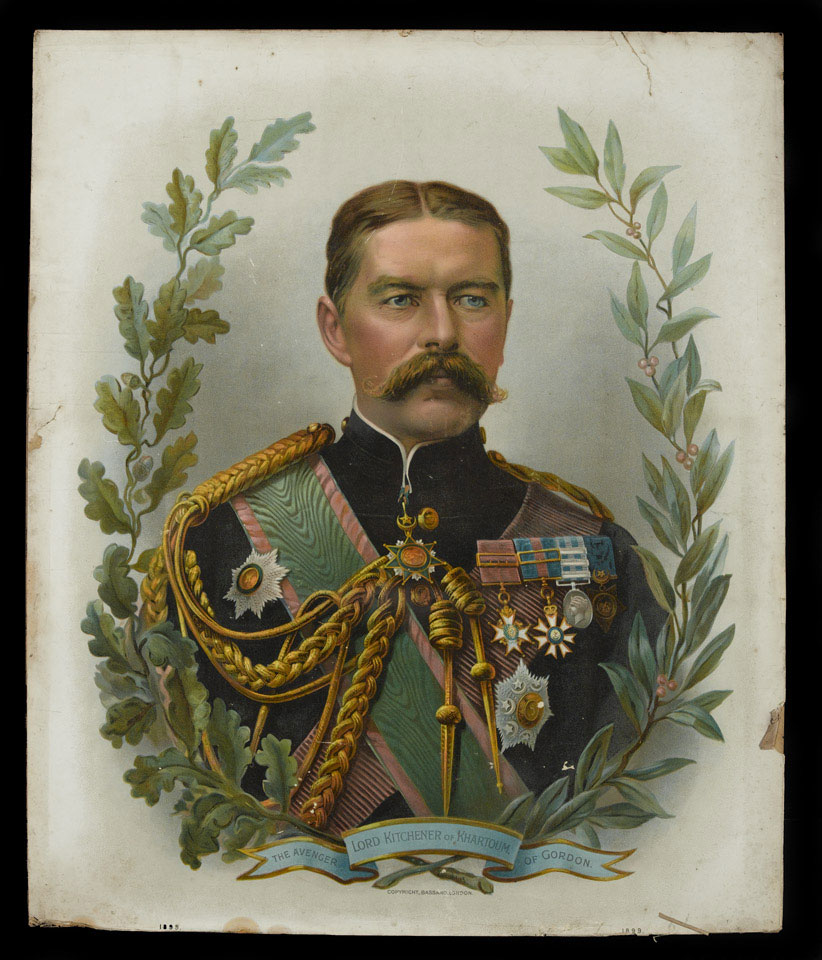
Online Collection
'The Avenger Lord Kitchener of Khartoum, of Gordon'
Chromolithograph from a photograph by Bassano, 1899. Published by Bassano, London, 1899.
After serving as a volunteer with a French ambulance in the Franco-Prussian War (1870-1871), Kitchener (1850-1916) was commissioned into the Royal Engineers in 1871. Following survey work in Cyprus and Palestine, he was promoted to captain and attached to the Egyptian Army. During the failed Nile expedition of 1884 he served as an aide de camp and was then commandant at Suakin (1886-1888). Kitchener was wounded at Handub in January 1888, commanded a brigade from 1889 until 1892 and was then made Sirdar (commander-in-chief) of the Egyptian army.
Promoted to major-general in 1896, Kitchener became a household name during the conquest of the Sudan. He built a railway to ensure logistical support and used river steamers to move his Anglo-Egyptian Army down the Nile. On 2 September 1898 he defeated the Mahdists at Omdurman. Rewarded with a peerage, in 1900 Kitchener was made lieutenant-general and posted to South Africa as Lord Roberts' chief of staff, where his organisational talents and energy did much to reverse the early defeats of the Boer War (1899-1902) and ensure British victory. However, whereas Roberts' heroic image remained unsullied at the end of the war; blame for its darker aspects, including the use of concentration camps, fell on Kitchener.
Kitchener was appointed Commander-in-Chief in India in 1902 and reorganised the Indian Army, merging the three Presidency armies into a unified force that had enough troops for internal security needs alongside a striking force of nine divisions and five cavalry brigades. During this period Kitchener clashed with the Viceroy Lord Curzon who resigned his position. Promoted to field marshal in 1909, Kitchener then turned his attention to reforming the colonial and dominion forces.
In 1911 he was made British agent in Egypt and embarked on a programme of reforms that did much to improve the country. Although he possessed great organisational skills and was a successful colonial campaigner and administrator, Kitchener found it difficult to delegate, or work as part of a team, and his austere demeanour did nothing to advance his personal popularity with those who served alongside him.
With retirement beckoning, he was appointed Secretary of State for War in August 1914. While many expected World War One to be 'over by Christmas', Kitchener realised it would be long and on an unprecedented scale. He appealed for volunteers for his 'New Armies' and was immortalised on Alfred Leete's 'Your Country Needs You' poster. For the next year and a half he virtually ran the war effort, providing the nation with an Army capable of meeting its continental commitment. However, like most of his contemporaries Kitchener failed to understand the realities of modern industrialised warfare. His influence declined in the aftermath of the 1915 'shell crisis' and the failed Dardanelles expedition, an operation he had supported in cabinet. Dispatched to Russia on a fact-finding mission, Kitchener drowned on 5 June 1916 when his ship struck a mine off Orkney.
NAM Accession Number
NAM. 1984-10-151-1
Copyright/Ownership
National Army Museum, Out of Copyright
Location
National Army Museum, Study collection
Object URL
https://collection.nam.ac.uk/detail.php?acc=1984-10-151-1

